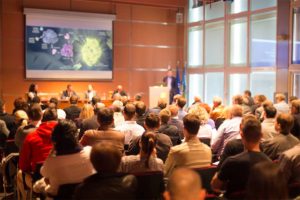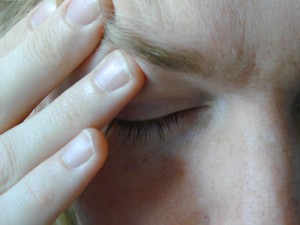 When I was in graduate school (a really long time ago), I remember going to my first big conference—American Society for Cell Biology—and being completely overwhelmed. I walked in with my Annual Conference Proceedings (back then it was all paper—no apps—and those books were thick, heavy and took up a ridiculous amount of space in your luggage). I had highlighted at least 100 posters that I was going to visit, along with one talk at every session that remotely applied to my work. And of course, I was not going to miss a single platform presentation. I was grimly determined to learn everything.
When I was in graduate school (a really long time ago), I remember going to my first big conference—American Society for Cell Biology—and being completely overwhelmed. I walked in with my Annual Conference Proceedings (back then it was all paper—no apps—and those books were thick, heavy and took up a ridiculous amount of space in your luggage). I had highlighted at least 100 posters that I was going to visit, along with one talk at every session that remotely applied to my work. And of course, I was not going to miss a single platform presentation. I was grimly determined to learn everything.
After a day-and-a-half, I was too tired to even troll the exhibition floor for freebies.
In my current job, I spend time monitoring hashtags for scientific conferences, and I occasionally notice a plaintive tweet from a conference attendee awash in a sea of posters and platform presentations—wondering where to start or where to stop.
So I asked our scientists at Promega what their tips are for getting the most out of a conference. Here are our Conference ProTips:
Have a plan.
To get the most out of a conference, spend some time before the conference doing a little homework.
Look over the agenda and conference schedule and make a list of talks, workshops and posters you want to attend. If your list is too big, start categorizing them as “must see”, “really want to see” and “if I have time see”.
One of our senior scientists described conference planning in terms of a dinner:
I usually organize an outline of plenary talks, satellite talks and poster sessions prior to the meeting that I need to attend to maintain professional relevance. I also add a smattering of reach-type talks in subjects that I am interested in learning more about for personal edification. I think about this by way of a food analogy: a salad and entree followed by dessert. –Andrew Niles
Many larger conferences have conference apps that allow you to build your own schedule—use the app, when it is available. Apps are useful because they often have convention center maps to help you get to where you want to go, and talks in concurrent sessions are easily accessible—so you can see what else is going on if your first choice fills up before you get a seat. On this last point, one scientist indicated that she always picks a second choice during concurrent sessions for just this reason.
Familiarize yourself with the map of the conference center, so you will know where you are going.
Set a goal for what you want to get out of the meeting, and make it reasonable.
Several scientists pointed out that it is easy to get completely overwhelmed at these meetings. Thomas Kirkland, PhD, Head of ATG Chemistry Research, says that he tries to remind himself that he doesn’t need to learn everything.
“If I have one actionable take-away from a conference (something that gives me a new research direction or changes my current research direction), that conference was a success.” —Thomas Kirkland
Several scientists note that there will be a few talks in which you are super-interested. You may want to take lots of notes for those, but for others, consider limiting yourself to one take-home message.
Plan some down time in your schedule. You can use this time to think about a really great talk you just heard, and you never know who you might meet in the hall way.
Make a plan for networking too.
Many of our scientists pointed out that one of the great things about conferences is the opportunity to converse with people you don’t normally get a chance to interact with. Networking is key—not just for your next career move, but to learn new experimental techniques and technologies or to exchange ideas about what works and what doesn’t with like-minded scientists.
Again, planning is key. Know who you want to talk to at a conference. Several scientists indicated that they see who is going to be at a conference and reach out via email beforehand to schedule coffee or lunch or a meet-up at a poster.
For conferences that are using an app, many allow attendees to share what talks they are going to and their social profiles. Chances are if someone has shared this information on an app, they are open to being contacted.
For those chance hallway or breakfast table meetings, several people suggested having a good conversation opener at the ready.
One thing I can share with you is a great opening question to start a conversation. If you see somebody that you would like to have a conversation with but don’t know how to get started, introduce yourself and simply ask “How is the conference going for you so far, are you finding it productive?”—Steven Edenson
Don’t miss opportunities to meet people. If there is a shuttle from the hotel to the conference, talk to the person next to you on the shuttle.
While the world has modernized and you can share your phone contact information, your twitter handle or URL, it’s still a good idea to have plenty of business cards that you can share with people you meet. They are cheap, informative, easy to carry and easy to share.
Save your health (and your budget).

Airplane trips are dehydrating. Conferences are fast paced. Exhibition hall food is expensive. So, save your budget and your health by making a quick trip to a convenience or grocery store for snacks (dried fruits, nuts) and water (or better yet pack a water bottle and some snacks from home). If you have these with you at the conference, you can skip the exhibition hall food lines (and food), and take advantage of impromptu hallway meetings.
Wear comfortable shoes. You will be doing a lot of walking. Probably with a backpack over your shoulder. Give your feet a break.
Remember that map of the conference center? Make sure you know where the bathrooms are too.
Don’t eat breakfast at the hotel (unless it’s included with your room). Most of the time you can walk a block, save $20.00 and taste the local cuisine, which is what travel is all about.
Take breaks. Rest. Have a coffee. Make sure you eat and sleep.
Have some fun.
You are traveling to a conference, and many of them are held in really great cities and locations.
Plan some down time not just to digest the conference experience but also to experience the conference city. If there is a conference outing featuring local food or music, go. If the conference offers field trips to local sites, try one.
Is your conference in Austin, TX? Go to the Congress St. Bridge at dusk and watch the bats fly. It’s free and it’s part of the local experience of the city.
Are you in Madison, WI? Take a walk on State St. between the Capitol and the University. Tour the Capitol. Spend some time on the Terrace at the University. It’s all free and it’s all worth it.
Conference in Chicago? Walk the Magnificent Mile. Visit the Field Museum or the Museum of Science and Industry.
Doing fun activities at the conference with other attendees is a great way to cement some of the networking you are doing too.
Make sure you see more than your hotel room and the conference center when you are at the conference. As one of our scientists put it “if you are having fun, especially with others, you often learn more and retain more than if you’re grimly focused on learning.”
Miscellaneous ProTips
- Don’t underestimate the value of the poster session. It’s the place where you can actually talk to the scientist who did the work.
- Keep an eye on the Twitter hashtag for the conference. You might get a tip on an interesting talk, exhibitor event that wasn’t advertised or spontaneous group outing.
- Pick at least one exhibitor that you have never heard of and ask them to explain their product/business/science. It is a great way to learn something new.
- Don’t be afraid to ask questions.
- If there is a “first-timers” orientation, go.
- Find small groups like breakfast round tables for socializing and exchanging ideas.
If you liked this blog, check out our Student Resource Center for more helpful articles, videos and tools.
Michele Arduengo
Latest posts by Michele Arduengo (see all)
- An Unexpected Role for RNA Methylation in Mitosis Leads to New Understanding of Neurodevelopmental Disorders - March 27, 2025
- Unlocking the Secrets of ADP-Ribosylation with Arg-C Ultra Protease, a Key Enzyme for Studying Ester-Linked Protein Modifications - November 13, 2024
- Exploring the Respiratory Virus Landscape: Pre-Pandemic Data and Pandemic Preparedness - October 29, 2024
